Wednesday Feb 18, 2026
Wednesday Feb 18, 2026
Wednesday, 13 November 2024 00:26 - - {{hitsCtrl.values.hits}}
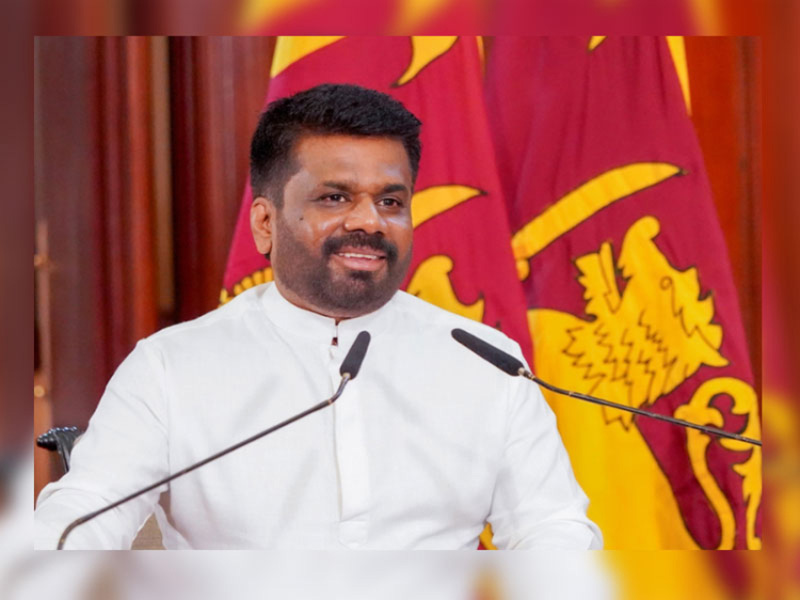
President Anura Kumara Dissanayake
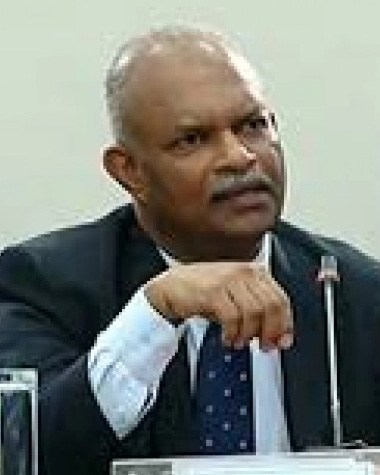
Shani Abeysekara
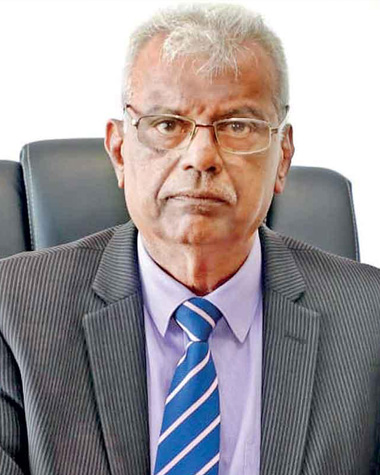
Ravi Seneviratne
 I have always been struck by two distinct moments in history. First, in June 1865, during the tenure of President Abraham Lincoln, slavery was abolished in the United States of America. And yet, there were slaves who were reluctant to embrace the associated freedoms. They appeared to be too attached to their chains.
I have always been struck by two distinct moments in history. First, in June 1865, during the tenure of President Abraham Lincoln, slavery was abolished in the United States of America. And yet, there were slaves who were reluctant to embrace the associated freedoms. They appeared to be too attached to their chains.
Then, in July 1945 C.W.W. Kannangara introduced an act in parliament to ensure free education for all Sri Lankans. He was compelled to debate for hours extolling the virtues of this move. There were many who attempted to throw sand in his wheels. Among the elites there were even those who argued that if this piece of legislation was passed, they wouldn’t be able to find a boy to pluck coconuts on their extensive properties.
After the bill was passed, it is reported that a stranger had approached Kannangara. He was none other than the former Indian diplomat Shri Madhav Shrihari Aney. He said, ‘Had you been born in my country and introduced such a bill you would have been treated like a god.’ The people of the country expressed their gratitude to Kannangara in the 1947 election by defeating him! The father of free education was sent home and in his place the people sent to parliament a rubber merchant by the name of Wilma A. Perera.
Many principled people who single-mindedly take bold steps for future generations of unborn citizens are often only appreciated many years and even decades later. It takes that much time, it seems, for society to ascertain the true value of what
they’ve done.
Lessons to learn
There are lessons Sri Lanka can learn from these particularly tragic pages in history.
It was the people of Sri Lanka who decided to completely overturn longstanding power dynamics and hand over the reins to a new political movement. The parties and forces that hitherto ruled the country were resoundingly rejected by the people, who for the first time put to an end the system of power alternating between the two major factions of an elite ruling class.
 The National People’s Power (NPP) movement claimed approximately 3% of the vote in 2019. It is truly remarkable that the NPP, led by the JVP, secured the presidency starting from such paltry numbers. It was, in short, historic.
The National People’s Power (NPP) movement claimed approximately 3% of the vote in 2019. It is truly remarkable that the NPP, led by the JVP, secured the presidency starting from such paltry numbers. It was, in short, historic.
There were many doubters, obviously. The leader of the coalition and Presidential hopeful Anura Kumara Dissanayake was in fact asked by his detractors, by way of dismissing his chances, to point out an instant in world history where such a massive improvement had been obtained.
He offered a characteristically mild mannered, optimistic and patriotic observation: ‘It is possible that something that has never happened anywhere in the world could happen in Sri Lanka.’
He was proven right.
The theme song of his election campaign contains these words: ‘A man who will turn into reality a centuries-old dream’
It took more than 70 years for people to realise that nothing tangible will result from casting votes on the basis of colour, ethnic affiliation and party symbol. Rulers do not descend from the sky; governments are elected by Sri Lankan citizens themselves. They represented certain political camps. By the same token many harboured doubts over a Dissanayake presidency. And yet, today, those who voted for him and even those who did not have begun to believe in him, begun to trust him. Moreover, some of his determinations seem to have rubbed off on the general citizenry. This is something new. It is indeed a revolutionary sense of hope.
There still remain people who are in shock and indeed are jittery over Dissanayake’s and the NPP’s ascendency. Among them are people who were corrupt, abused power, misused public property and funds and indeed the entire elite class who kept political leadership on both sides of the aisle on speed dial as a matter of survival.
They are aware that this President cannot be arm-twisted into delivering privileges or getting them off the hook when they have run afoul of the law. They are also aware that considering the immense popularity that he enjoys and his political strength it would be a tough task to attack him directly. They are also fearful of two other individuals, DIG Shani Abeysekera of the police Criminal Intelligence Division and Ravi Seneviratne, Secretary to the Ministry of Law and Order. Both these highly decorated police officers are being attacked because it is well known that they will bow only before the law.
They will not be swayed
This terrified class of people still have their numbers and considerable financial resources and these they have deployed and will continue to deploy against such individuals.
The truth is Ravi Seneviratne and Shani Abeysekara have impeccable professional records in law enforcement. They have proven time and again that they will not be swayed to err by any politician, not even the highest in the land. They have long been widely respected for being independent and law-abiding.
Seneviratne, a retired senior Deputy Inspector General of Police and former intelligence and STF officer, was the only leader of the Criminal Investigation Department (CID) to have served continuously under three Presidents, Mahinda Rajapaksa, Maithripala Sirisena and Gotabaya Rajapaksa. While serving at the CID under the Rajapaksas, he protected his officers who led investigations against regime loyalists like Duminda Silva or DIG Vaas Gunawardena.
Abeysekara, who served under him, is universally known as the most fearless and capable detective in Sri Lanka’s history. If you can remember any emblematic murder conviction in the last 20 years, it is quite likely one of the record setting 35 plus killings that Shani has personally investigated, and whose testimony secured convictions.
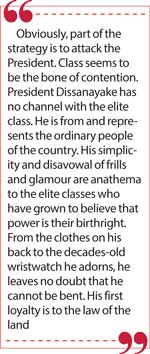 He has often been punished, harassed, transferred or otherwise persecuted for refusing to bend the knee to politicians, perhaps never more famously or wretchedly than during the Gotabaya Rajapaksa regime. But despite channelling the full might of Sri Lanka’s police force and intelligence services in an effort to trump up a case against Shani for their entire time in office, the 2019 regime could never prove any wrongdoing on his part.
He has often been punished, harassed, transferred or otherwise persecuted for refusing to bend the knee to politicians, perhaps never more famously or wretchedly than during the Gotabaya Rajapaksa regime. But despite channelling the full might of Sri Lanka’s police force and intelligence services in an effort to trump up a case against Shani for their entire time in office, the 2019 regime could never prove any wrongdoing on his part.
That is why an independent Seneviratne and Abeysekara, unimpeded by the law-abiding and institutionalist President Anura Dissanayake, represent such a terrifying threat to the class of criminals who felt they could resolve their legal disputes through a series of phone calls to politicians, policemen, judges and prosecutors. Unless those who have cut corners and lined their pockets are able to discredit these men, their era of impunity is over.
Since they are unable to take any direct action against these individuals, they have deployed various pawns in the media, in legal circles and even religious entities to do their dirty work by vilifying these officers. They are all birds of a feather. The people need to be vigilant about these agent provocateurs. In fact such honest and capable officers and politicians who are truly beholden to the people would do well to remember that their biggest strength is the trust of the people which they need to hold sacred at all times.
Class seems to be the bone of contention
Obviously, part of the strategy is to attack the President. Class seems to be the bone of contention. President Dissanayake has no channel with the elite class. He is from and represents the ordinary people of the country. His simplicity and disavowal of frills and glamour are anathema to the elite classes who have grown to believe that power is their birthright. From the clothes on his back to the decades-old wristwatch he adorns, he leaves no doubt that he cannot be bent. His first loyalty is to the law of the land.
Ranasinghe Premadasa, the former president, did not belong to that class either, but he came to power as the leader of a party that represented the elite, finding ways to elevate his allies into their ranks. Anura on the other hand is a transformational leader whose political group had to farm a 3% share of the vote into numbers that would suffice to capture the presidency. This remarkable transformation was not just believed to be hard but actually impossible. This man, who hails from a nondescript village in Thambuttegama, did the impossible once, and those who once thought it was impossible to hold them accountable before the law are terrified that he will do it again.
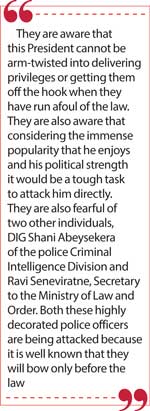 Renowned man of letters, Martin Wickramasinghe described the political upheavals associated with 1956 as the fall of the “bamunu kulaya” or the brahmin class, “brahmin” being a word used as proxy for “elite”. What has happened now can be described as the fall of the corrupt class.
Renowned man of letters, Martin Wickramasinghe described the political upheavals associated with 1956 as the fall of the “bamunu kulaya” or the brahmin class, “brahmin” being a word used as proxy for “elite”. What has happened now can be described as the fall of the corrupt class.
The nexus between political class and family or even class in Asian countries is no secret. Most nations that have ‘opted’ for this obsession have failed or at least fallen short of reaching full potential. India is the prime example. The Nehru family dominated Indian politics for decades. Eventually, in their own words, it was a ‘boy who sold tea in trains’ who changed all that.
Narendra Modi was mercilessly attacked by the elites, and his elevation had forced them into the political wilderness. Modi simply said, ‘Yes, it is true that I sold tea, but I didn’t sell off the country.’
The former Chief Minister of Uttar Pradesh and leader of the Bahjujan Samaj Party, Mayawathi, insulted Modi. West Bengal’s Chief Minister Mamatha Banerjee called him a monkey. Modi was unperturbed. He became Prime Minister and has spearheaded the transformation of India.
The ignominy of defeat
It is not unnatural for those who have enjoyed or have arrogated upon themselves elite status to do their utmost to unseat any leader or party that somehow doesn’t fit their class. This is how it is even in Sri Lanka. This is why unlike in other instances of political change where the newly elected are usually given a grace period before the opposition starts challenging them, Anura Kumara Dissanayake and the NPP were targeted from day one. It is the ignominy of defeat compounded by having to suffer a regime made of a ‘lesser class’ so perceived that’s fuelling the impatience and driving invective.
This Government is made of a President and just three MPs. It has a three-member Cabinet. The challenges are enormous. Everyone, including experts, have warned that the next five years will be tough, whoever happens to be in power. The economic crisis was not engendered by Dissanayake or the NPP. They have been forced to carry someone else’s cross. Those who attack the President and the NPP know this very well, but they simply cannot contain their envy and losing what they believe is their birthright.
Clearly, they fear a stable government. They are terrified that Anura and his team will approach the challenges with sobriety, that they will exercise patience, set realistic goals and go about achieving them in a systematic manner. So they act in concert to attack the Government even as they cling to power in their own political parties and struggle to survive.
 This change has occurred after more than 70 years. Sometimes, the need for change has been compromised by certain practical difficulties. The ‘Yahapalana’ initiative was one such occasion. It failed because the deal-politics of the elite class would not suffer such change. It brought back the Rajapaksas to power in record time. Finally, the country went bankrupt. Anura and the NPP have their work cut out for them. They have the responsibility of turning things around. If they do succeed, it will benefit the people immensely to the detriment of the corrupt, self-serving, self-righteous elites who are directly or indirectly responsible for bringing the country to this sorry state. They are well aware of this; hence their determination to bring Anura and the NPP down and recover the power that the people in their wisdom took away.
This change has occurred after more than 70 years. Sometimes, the need for change has been compromised by certain practical difficulties. The ‘Yahapalana’ initiative was one such occasion. It failed because the deal-politics of the elite class would not suffer such change. It brought back the Rajapaksas to power in record time. Finally, the country went bankrupt. Anura and the NPP have their work cut out for them. They have the responsibility of turning things around. If they do succeed, it will benefit the people immensely to the detriment of the corrupt, self-serving, self-righteous elites who are directly or indirectly responsible for bringing the country to this sorry state. They are well aware of this; hence their determination to bring Anura and the NPP down and recover the power that the people in their wisdom took away.
We are, then, facing a tremendous challenge. This is the time to close ranks against the corrupt, elitist cabal that has never really cared about the people or the country. The garbage can of history awaits them. The people have to nudge them in that direction, and leave it to our institutions to finish the job.